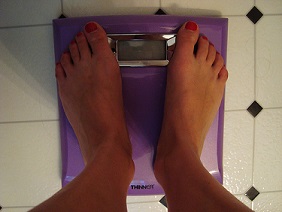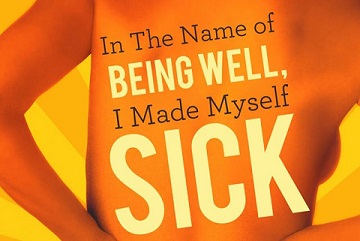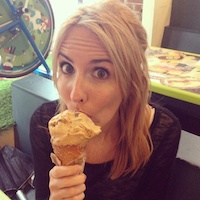
I didn’t taste apple juice until I was a teenager.
It wasn’t allowed in my childhood home—too many empty calories.
One of the principal pieces of wisdom my sister and I grew up on was to not drink our calories (along with, if you can’t tone it, tan it). My first sip of apple juice was sweeter than my first taste of champagne.
I have counted, measured and weighed every single thing that has gone into my mouth since I was seven years old.
I was on a diet every day for almost 21 years. I have run the full spectrum of eating disorders, and I cannot remember a time that I did not associate my self-worth with the number on my scale, which I checked in with several times a day, just to make sure I was beating myself up with the proper amount of self-loathing.
I have starved, I have purged, I have binged, I have over-exercised. The few times I got scarily thin I made excuses about having a fast metabolism, all the while congratulating myself and pledging to get even thinner, to eat even less so that I could disappear a little more.
And that was what it was really about, all along.
I have very few early childhood memories where things were ok, and we were happy. Very early, things became extremely dysfunctional and very tumultuous, and remained that way for a long, long time.
My young heart and mind lacked the emotional coping skills to process all of the changes, diseases, deaths, fights, betrayals—the overwhelming everything, and so I desired to be empty of it all. To disappear from it all. If I could be empty, if I could disappear, if I could control this one aspect of my life, it meant that my whole life was not full of despairing hurt and chaos.
Now, this realization comes after years of reflection and therapy.
It hurts me to think of myself as this little girl, feeling so out of control, so full of hurt, anger, hopelessness, that

the only tool in her tiny arsenal, the only thing she felt she could control, was her body, the food that went into it. It hurts even more to think that this little girl’s coping mechanism grew into how the teenager, and later on, the woman, learned how to communicate with her body, with friends, with men and with the world.
It changed everything, this obsession with food, with needing to feel empty, to disappear.
I isolated myself from friends, from relationships. Turned down plans if they included food. I remember opening a friend’s freezer to discover she had cookie dough ice cream and thinking, “How can she keep that in here?” , because I would not allow myself to keep any “junk food” in the house.
My cycle was such that if I had junk food, I would eat it, then punish myself by purging, starving, and over-exercising, and then start the whole vicious cycle over again.
Oh, how I envied people who could have a cookie after dinner, or candy at the movies, and not immediately plot and plan how they would excise those evil calories from their bloodstreams!
And dates! How do you date when most of your life revolves around counting your food and how you are going to get rid of it? How do you get close to someone without revealing that you feel very, very broken in a pretty big way?
Easy. You don’t. Not really.
If you do date, you keep that part of you close to you and secreted away, explaining it as a fast metabolism, being a picky eater or my favorite, “loving to be active.”
There are all kinds of ways to explain away eating disorders, and most people are masters. If you or someone you know is overusing these phrases a lot, or you suspect you or they may really have an eating disorder, check out this site and maybe take a free screening.
Eating disorders affect more people than you may think: your sister, your boyfriend, your room mate, your co-worker. Getting help can feel difficult, but it is never too late, and support is important.
If all of this sounds pretty exhausting, and very lonely, it was.
It finally reached a crescendo after about a month of pretty extreme purging and isolation. One morning, after checking how much I loved myself on the scale, I looked in the mirror. I was shaking from purging, I had black circles under my eyes from not sleeping, and I felt more drained than I ever had in my life—physically, emotionally, spiritually. I realized that I was out of control…

But then again, I never really was in control.
My eating disorder only wanted me to think that I was, because it wanted me to be sick. Eating disorders, like addictions, don’t kill by force—they seduce.
Just a little more. You’ll feel better. We love you. We’re your real friends. Life is so hard—this will make the pain go away.
I did the hardest thing I have ever done in my life— I gave up control. I called my mom and confessed everything. I went into treatment. I began following an eating plan. I stopped purging, I stopped over-exercising, and I threw out the goddamn scale.
Today, I am getting to know my body. I am learning to gauge when it feels hungry, when it feels full, when it needs rest, when it wants to run, and when it wants to backbend. Those may sound like basic things, but for someone who has kept their body pretty numb for the past 21 years, they are all new, exciting and scary as hell.
At least six times per day I feel amazing that I have no idea what I weigh but think I look great anyway. At least seven times per day I freak out that I have no idea what I weigh and worry that I have gained 15 pounds overnight.
I am hopeful that each day those numbers will equalize a little more. I am learning to nourish my body with food. That exercise is to invigorate, not to punish. To feel the feelings—even when they hurt and overwhelm.
I am learning to get full. And I am learning that I am worth a lot—a whole hell of a lot more than the numbers on a scale.
Love elephant and want to go steady?
Sign up for our (curated) daily and weekly newsletters!
Editor: Rachel Nussbaum
Photo: Maria Raquel Cochez, elephant archives










Read 0 comments and reply